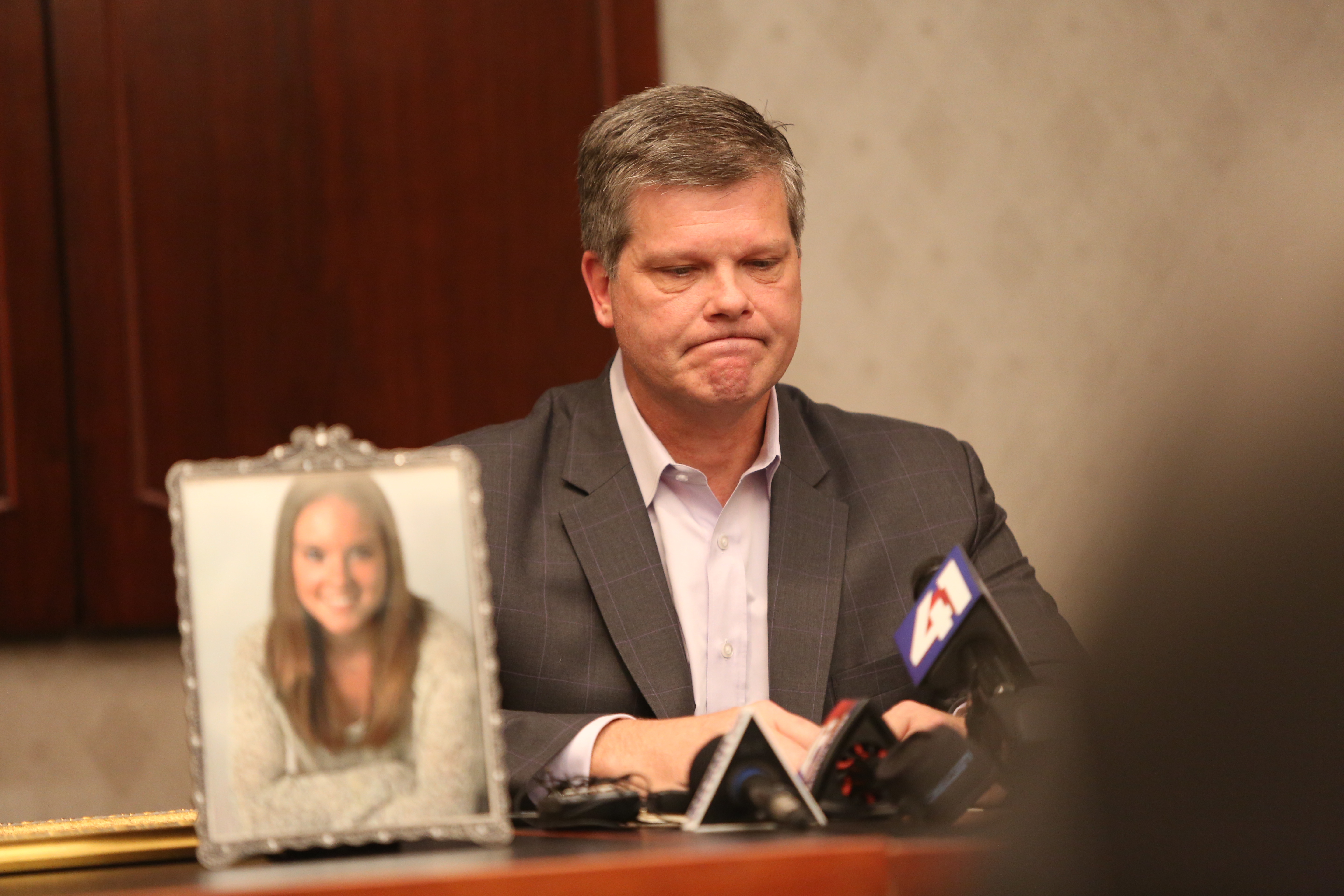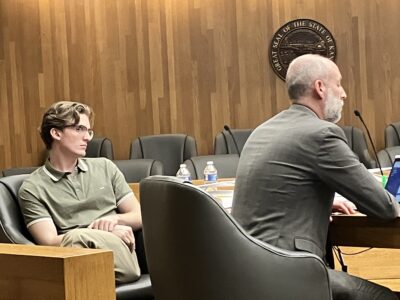KU pays $395,000 to settle Title IX lawsuits by women who alleged sexual assaults by football player

photo by: Journal-World file photos
A federal judge has dismissed Title IX lawsuits against the University of Kansas by former KU rowers Daisy Tackett, top, and Sarah McClure, bottom, at the request of the plaintiffs and KU.
The University of Kansas is paying $395,000 for two former female rowers to drop their Title IX lawsuits against the school, settlement agreements reveal.
The out-of-court agreements ending the highly publicized lawsuits were provided to the Journal-World Friday, in response to the newspaper’s recent Kansas Open Records Act request to the university. The women sued KU after they said they had been sexually assaulted by a football player.
KU agreed to pay $245,000 to plaintiff Daisy Tackett and her attorneys and $150,000 to Sarah McClure and her attorneys, according to the documents. The university is paying about $102,000 of Tackett’s sum and $63,000 of McClure’s sum directly to Brown and Curry Law Firm of Kansas City, Mo., which represented both women.
The documents say both sides, following court-ordered mediation, agreed that resolving the disputes was in their best interest to avoid “the expense and uncertainty of litigation.” KU also is bearing the costs of the mediator, though a dollar amount is not included in the agreements.
KU still denies the women’s allegations that it broke the law.

James Tackett, center, takes questions from reporters on behalf of his daughter Daisy Tackett at a press conference Monday, March 21, 2016, in Kansas City, Mo. Daisy Tackett, who did not appear at the press conference, said she was raped in fall 2014 at Jayhawker Towers and filed a lawsuit against Kansas University alleging KU violated federal Title IX law by creating a hostile environment on campus. Also pictured are Kansas City, Mo., attorneys Dan Curry, left, and Tony LaCroix, right.
“The university denies any and all such claims of discrimination and retaliation, and the university is confident that it fulfilled its obligations,” the agreements say. “It has effective policies and procedures in place to prevent and respond to sexual harassment and retaliation.”
The agreements also shut down all public conversation about the cases by anyone directly involved.
Under confidentiality clauses in the documents, the women are not allowed to talk about the terms of the settlements or even disclose that the settlements exist — though the agreements do note that, as KU is a government agency, the documents are subject to the Kansas Open Records Act.
The women also are not allowed to disparage KU or KU Athletics verbally or in writing, or talk to the media or post on social media about their cases, under the agreements.
The university agreed to “instruct their senior leadership and their current and former rowing coaches” not to make any negative comments that might cause anyone to question the integrity or character of the women, according to the agreements.

Jim McClure, of Wilmette, Ill., speaks on behalf of his daughter, Sarah McClure, at a press conference Thursday in Kansas City, Mo. Sarah McClure, under the name Jane Doe 7, is suing Kansas University for failing to properly address her sexual assault report.
The two similar lawsuits accused KU of failing to properly handle the women’s reports of being sexually assaulted at Jayhawker Towers apartments by a KU football player. Both members of the KU rowing team at the time of the assaults, Tackett and McClure also accused rowing coaches of retaliating against them after they reported the assaults.
Jury trials had been set for July 2018 in Tackett’s case and for October 2018 in McClure’s case.
On Nov. 21, U.S. District Court Judge Thomas Marten dismissed both cases at the request of all parties. The cases were dismissed “with prejudice,” meaning the same claims can’t be refiled.
In response to questions about the cases’ dismissal, KU spokespeople and the women’s attorney, Dan Curry, have responded only with, “The matter has been resolved” — which the agreement specifies is the only thing they can say.
Since the dismissal, the women’s parents also have said that neither they nor their daughters could comment.
•••
Both cases had been pending — and covered extensively by regional and even national media — since spring 2016.
Tackett was a freshman in fall 2014 when, after a Halloween party, the football player raped her in his apartment at KU’s Jayhawker Towers, according to allegations in her lawsuit. Tackett reported the rape to KU a year later, in October 2015, after hearing another rower had been assaulted by the same man. Tackett did not file a police report.
A week into McClure’s freshman year at KU, in August 2015, the same football player fondled McClure’s breasts in her apartment at Jayhawker Towers, according to allegations in her lawsuit. In October 2015, McClure reported the assault to KU and also filed a police report, though the report did not result in criminal charges.
KU’s Office of Institutional Opportunity and Access investigated, found the man — who was a walk-on on the football team — responsible for assaulting both women and banned him from campus in midspring 2016. The finding was based on a preponderance of the evidence, not on the criminal court standard of guilt beyond a reasonable doubt.
Tackett withdrew from KU in early 2016, and McClure finished the spring 2016 semester but did not return in the fall.
At a March 2016 press conference scheduled by Curry to announce Tackett’s lawsuit, Tackett did not appear but her father did.
James Tackett called the situation “every father’s nightmare.”
Tackett read this statement from his daughter: “I did not feel safe after my report. My coaches did not care. I felt like I did every single thing KU asked of me, and I feel that they did not hold up their end of the bargain. KU did not protect me, and I was not able to be a student or an athlete there.”
McClure came forward by name in June 2016, several months after her lawsuit had been filed under the name Jane Doe 7.
“I was assaulted by the same football player who assaulted another rower on the team. I chose to stand up for myself and reported him to KU, then KU did nothing for months,” McClure said, in a video statement played at a press conference and posted online. “They made my life a living nightmare.”
Her father, who appeared in person at the press conference, said he believed the man’s spot on the football team protected him.
“No matter which direction you turn, there seems to be preferential treatment for athletes,” Jim McClure said. “At times you scratch your head and say ‘what happened to the law?'”
•••
Title IX is the federal law prohibiting sex-based discrimination in education, including sexual violence.
Earlier this year, Judge Marten did dismiss a significant portion of the lawsuits, specifically the women’s allegations that KU was institutionally liable for their sexual assaults before they occurred.
The women had argued KU should have known there was a heightened risk of sexual assault at Jayhawker Towers apartments, where football players live with less supervision than in residence halls. They also alleged that KU required female rowers to go to football games and cheer for the players and encouraged the women to attend off-campus parties with football recruits.
Marten dismissed that claim, saying such “alleged policies” played no role in the women’s reported assaults, and there’s no allegations they were assaulted at sanctioned events or that KU somehow encouraged misconduct by the football player, named in court documents as “John Doe G.”
•••
In addition to settling the women’s individual lawsuits, KU also reached a confidential out-of-court-settlement agreement in a third related lawsuit.
The Journal-World also received that agreement Friday, in response to its open records request.
In that suit, the women and their parents argued that KU violated the Kansas Consumer Protection Act by repeatedly representing to them and other prospective and current students that university residence halls were safe when, in fact, campus housing for years has been home to “a known, persistent and growing problem of instances of sexual assault.”
After that lawsuit was dismissed by a judge in Douglas County District Court, the women and their parents filed an appeal that was pending at the time of the agreement, according to the document.
Under that agreement, KU paid each plaintiff a nominal sum — $10 — and the plaintiffs promised to drop their claims and never refile them. Also in that agreement, KU denied wrongdoing.
- A federal judge has dismissed Title IX lawsuits against the University of Kansas by former KU rowers Daisy Tackett, top, and Sarah McClure, bottom, at the request of the plaintiffs and KU.
- James Tackett, center, takes questions from reporters on behalf of his daughter Daisy Tackett at a press conference Monday, March 21, 2016, in Kansas City, Mo. Daisy Tackett, who did not appear at the press conference, said she was raped in fall 2014 at Jayhawker Towers and filed a lawsuit against Kansas University alleging KU violated federal Title IX law by creating a hostile environment on campus. Also pictured are Kansas City, Mo., attorneys Dan Curry, left, and Tony LaCroix, right.
- Jim McClure, of Wilmette, Ill., speaks on behalf of his daughter, Sarah McClure, at a press conference Thursday in Kansas City, Mo. Sarah McClure, under the name Jane Doe 7, is suing Kansas University for failing to properly address her sexual assault report.







